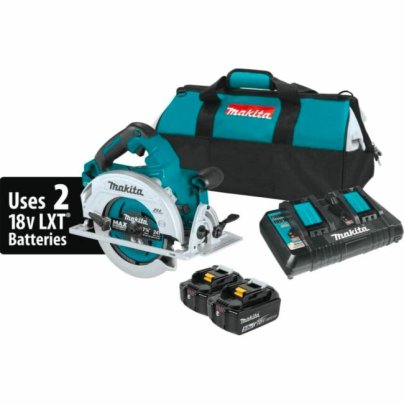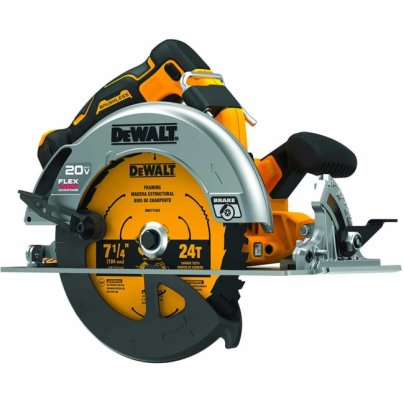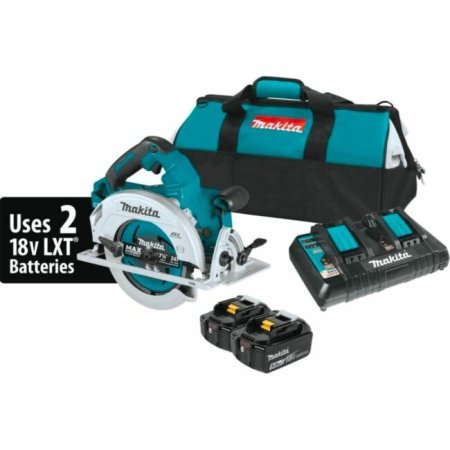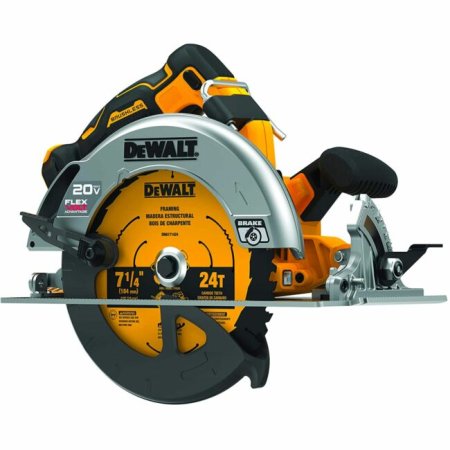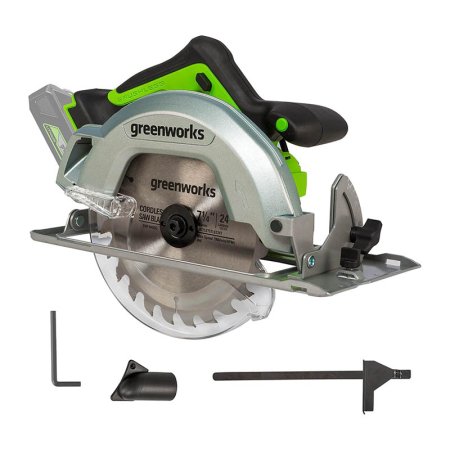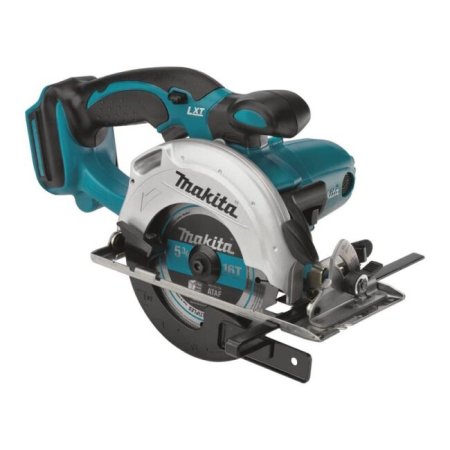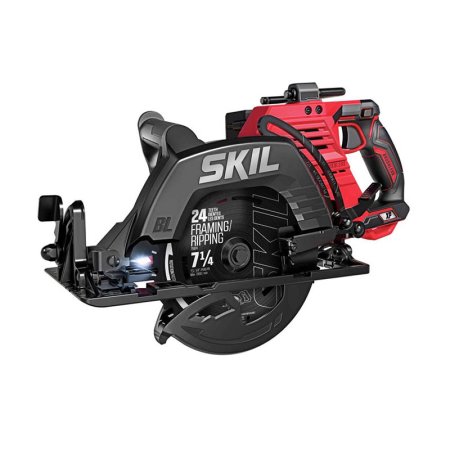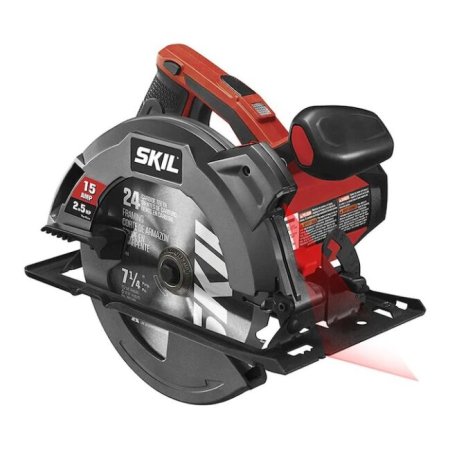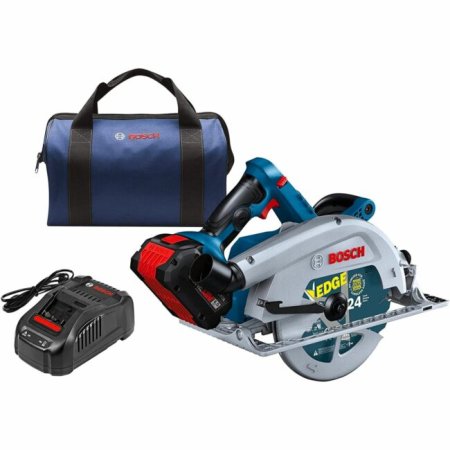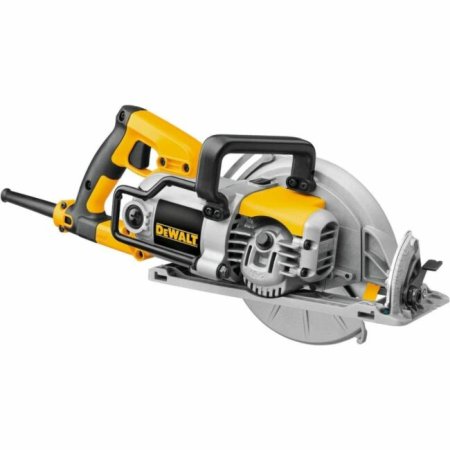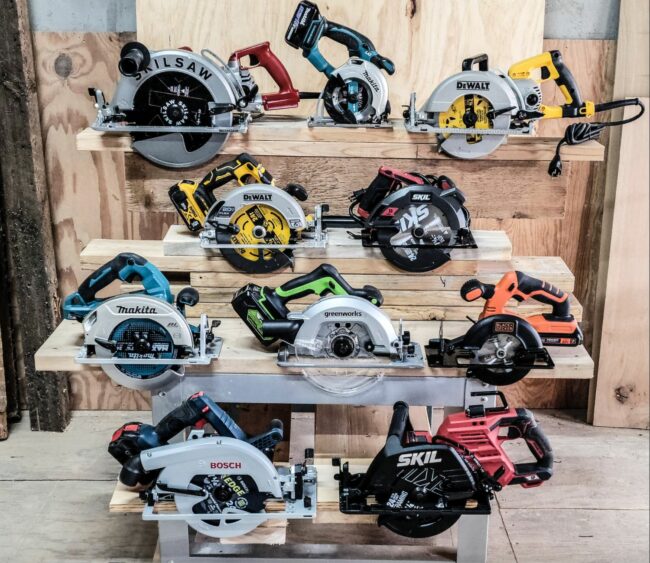
We may earn revenue from the products available on this page and participate in affiliate programs. Learn More ›
Anyone who’s worked on a construction site or been part of their home’s renovation knows how versatile circular saws are. When it comes to breaking down a sheet of plywood and making quick, repetitive cuts on a stack of framing lumber, it’s the best tool for the job. Still, with the abundance of saw brands, power options, and features available, choosing the right one can be challenging. That’s why we tested 10 top models to see which will push your project along and which might hold you back.
To help us select the models we feel confident recommending, we also reached out to a home improvement expert to get his take on how to choose one of these powerful tools. Based on his insights and our hands-on tests, we chose the Makita XSH06PT 36V Brushless 7¼” Circular Saw Kit as our favorite circular saw for its quality contraction and user-friendly operation.
The results of our tests on the Makita XSH06PT and the rest of the saws is below, alongside a quick peek at a product that wasn’t reliable enough to make our list. After pushing these tools to their limits cutting timbers, particle-strand lumber (PSL), plywood, and dimensional lumber, we can accurately say the following lineup represents a solid selection of the best circular saws on the market.
- BEST OVERALL: Makita XSH06PT 36V Brushless 7¼” Circular Saw Kit
↓ Jump to Review - RUNNER-UP: DeWalt DCS573B 20V MAX 7¼” Cordless Circular Saw
↓ Jump to Review - BEST BANG FOR THE BUCK: Greenworks 24V 7¼” Cordless Battery Circular Saw
↓ Jump to Review - BEST SMALL: Makita XSS03Z 18V LXT Cordless 5⅜” Circular Trim Saw
↓ Jump to Review - BEST FOR FRAMING: Skil CR5429B-20 PWR CORE 20 Brushless 7¼” Circular Saw
↓ Jump to Review - BEST LASER GUIDE: Skil 5280-01 Corded 7¼” Circular Saw
↓ Jump to Review - BEST FOR TIMBERS: Skil SPT70WM-01 10¼” Magnesium Worm Drive Skilsaw
↓ Jump to Review - BEST KIT: Bosch Profactor 18V 7¼” Circular Saw Kit
↓ Jump to Review - BEST FOR PROS: DeWalt DWS535B 7¼” Worm Drive Circular Saw
↓ Jump to Review
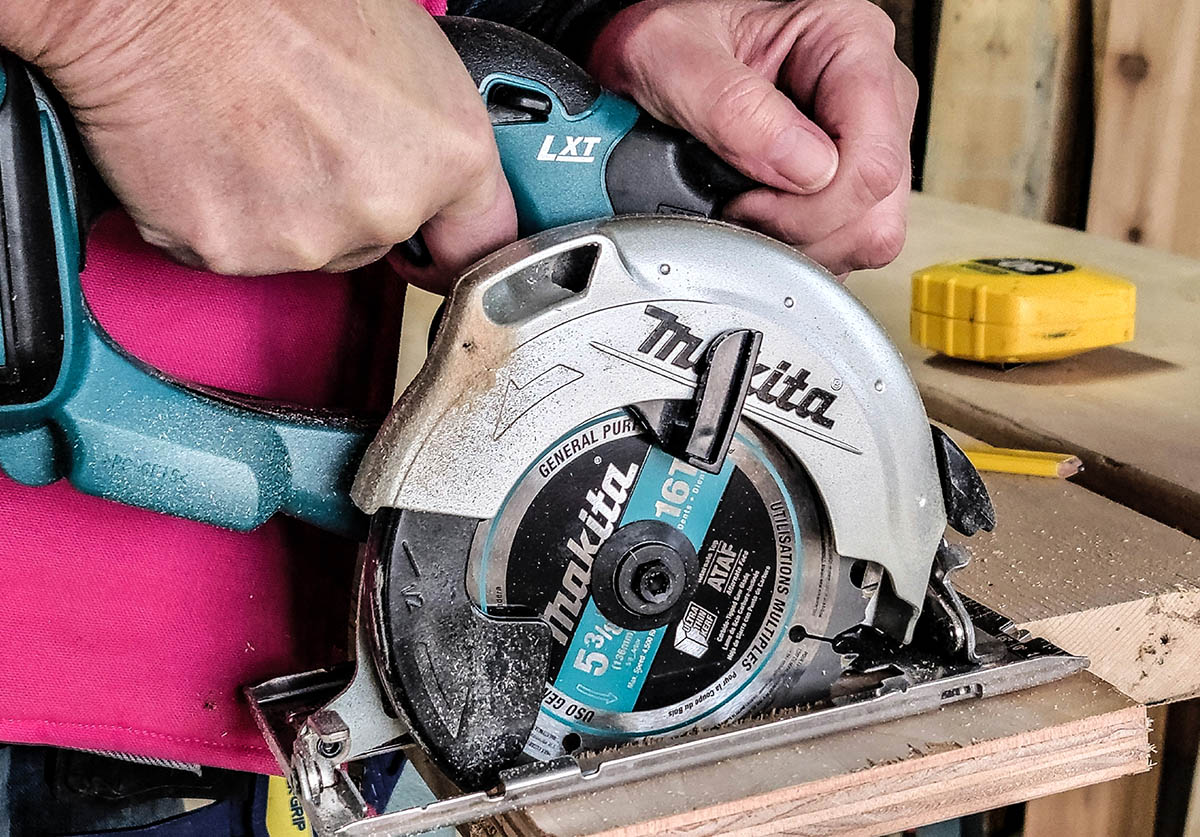
Circular Saw Comparison Chart
| Product Name | Power Source | Speed | Size |
| Makita XSH06PT 36V Brushless 7¼” Circular Saw Kit | 36-volt (V) battery | 6,000 RPM | 7¼ inch |
| DeWalt DCS573B 20V MAX 7¼” Cordless Circular Saw | 20V battery | 5,500 RPM | 7¼ inch |
| Greenworks 24V 7¼” Cordless Battery Circular Saw | 24V battery | 4,500 RPM | 7¼ inch |
| Makita XSS03Z 18V LXT Cordless 5⅜” Circular Trim Saw | 18V battery | 3,600 RPM | 5⅜ inch |
| Skil CR5429B-20 PWR CORE 20 Brushless 7¼” Circular Saw | Two 20V batteries | 5,300 RPM | 7¼ inch |
| Skil 5280-01 Corded 7¼” Circular Saw | Corded 15-amp motor | 5,300 RPM | 7¼ inch |
| Skil SPT70WM-01 10¼” Magnesium Worm Drive Skilsaw | Corded 15-amp motor | 4,700 RPM | 10¼ inch |
| Bosch Profactor 18V 7¼” Circular Saw Kit | 18V battery | 5,000 RPM | 7¼ inch |
| DeWalt DWS535B 7¼” Worm Drive Circular Saw | Corded 15-amp motor | 4,800 RPM | 7¼ inch |
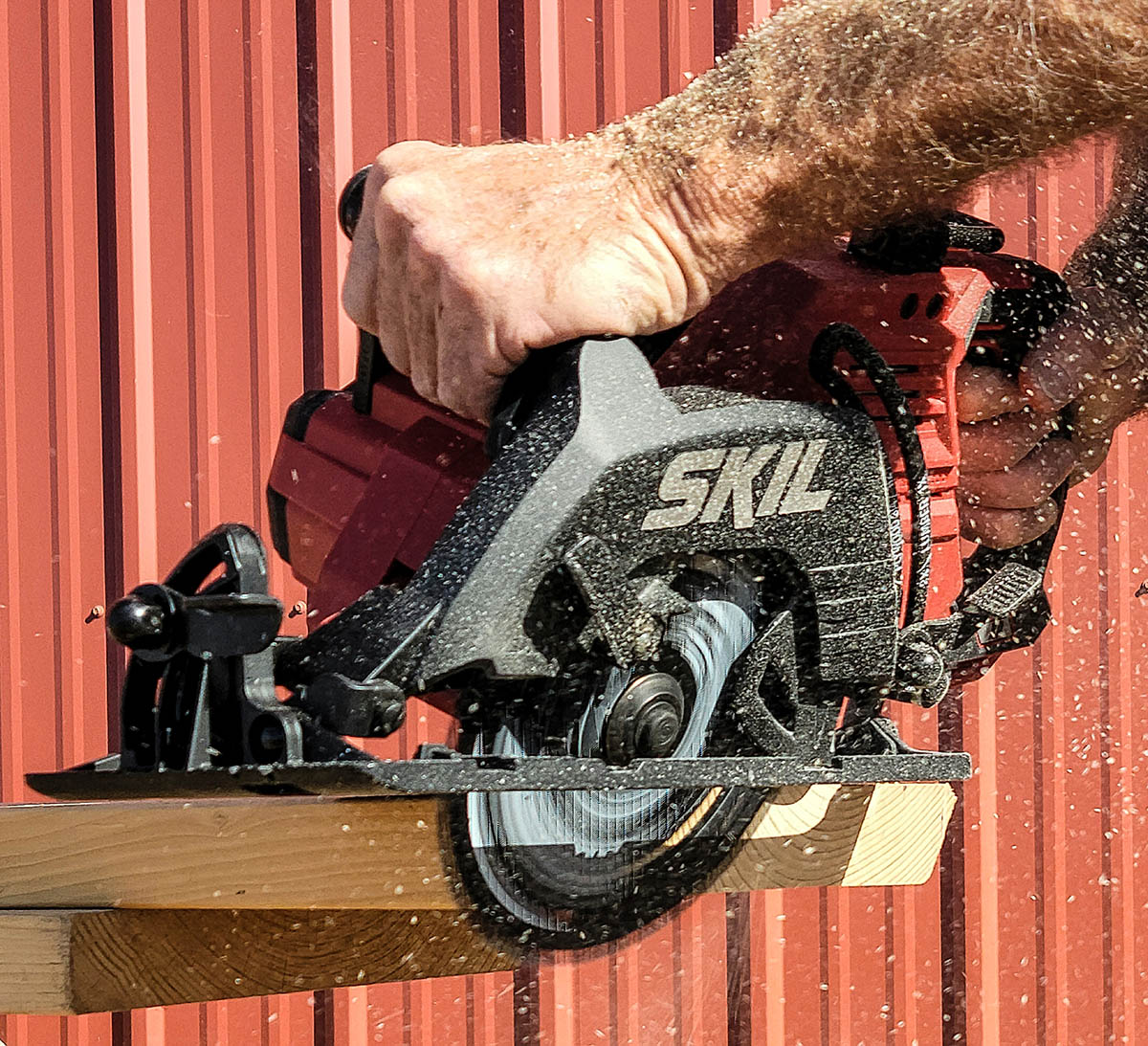
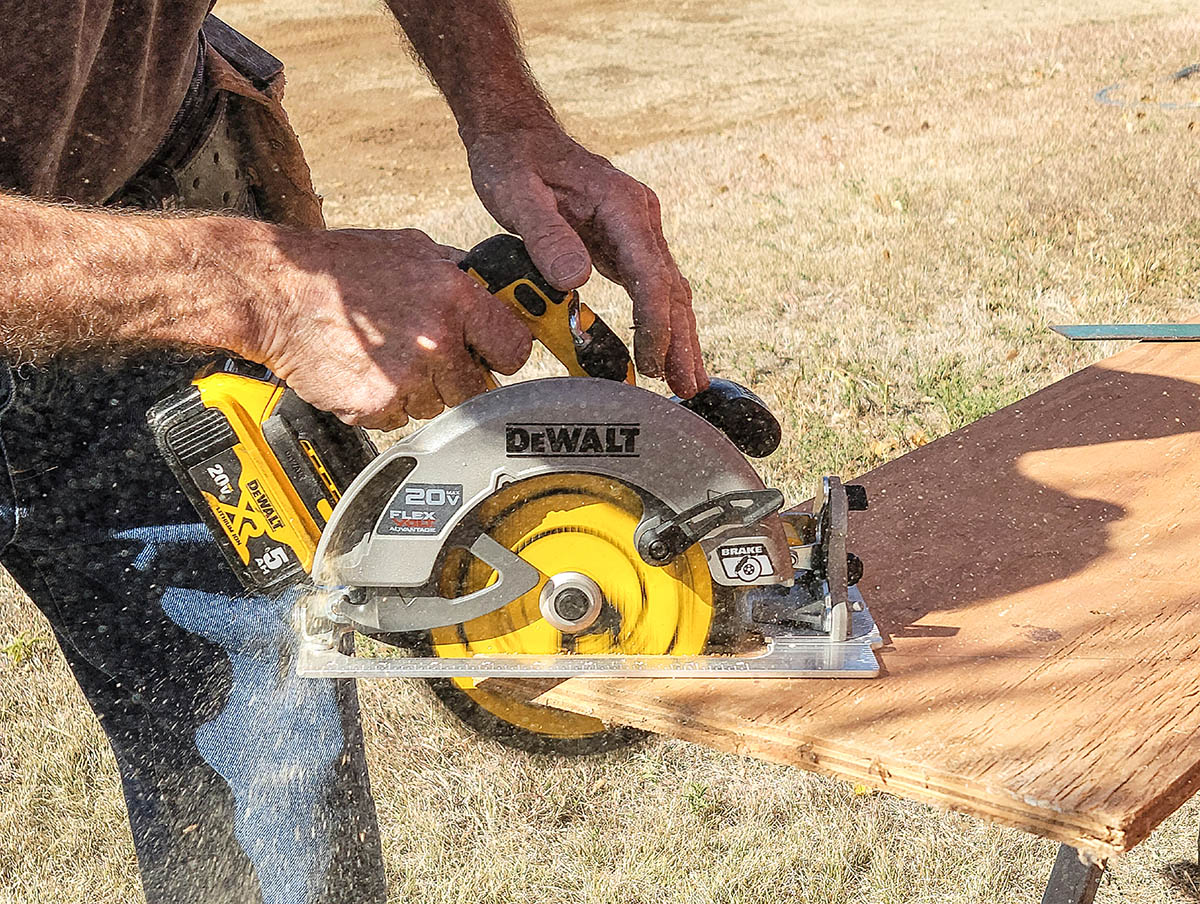
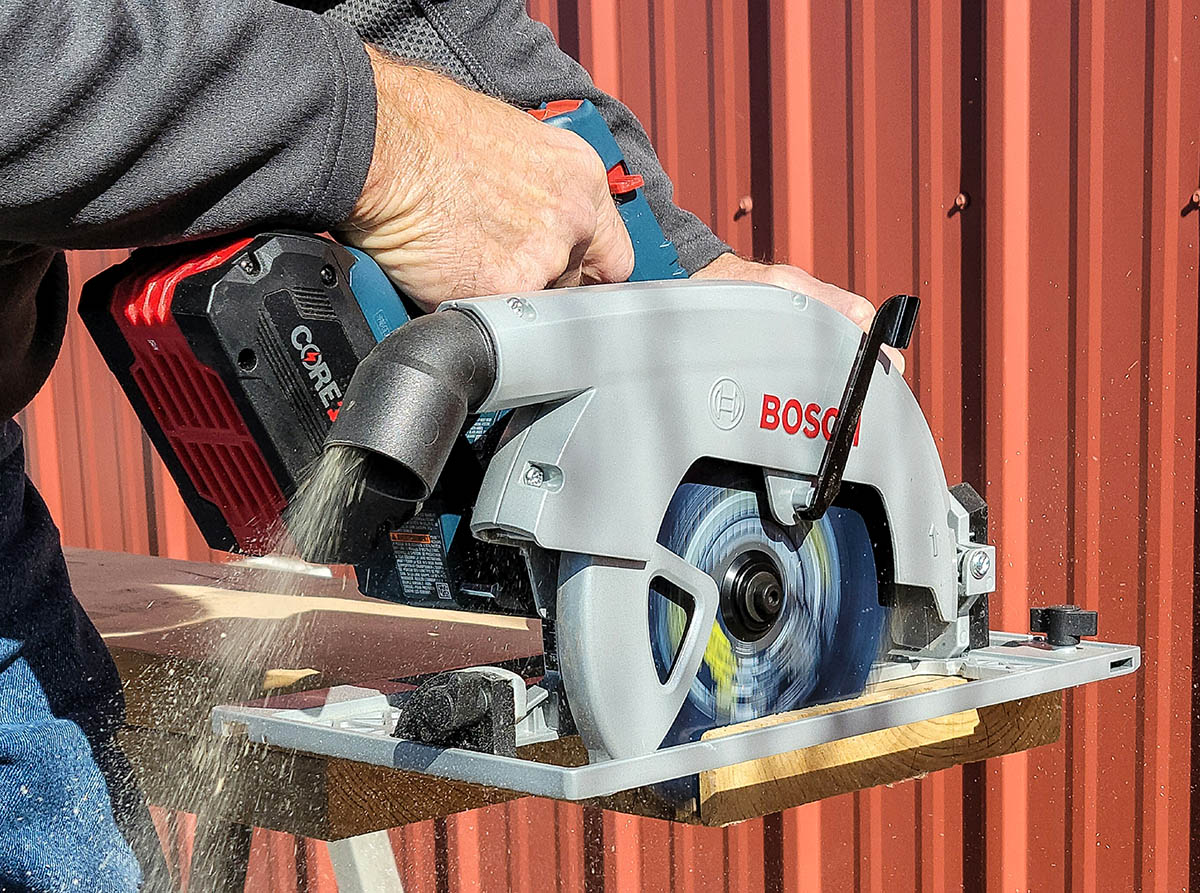
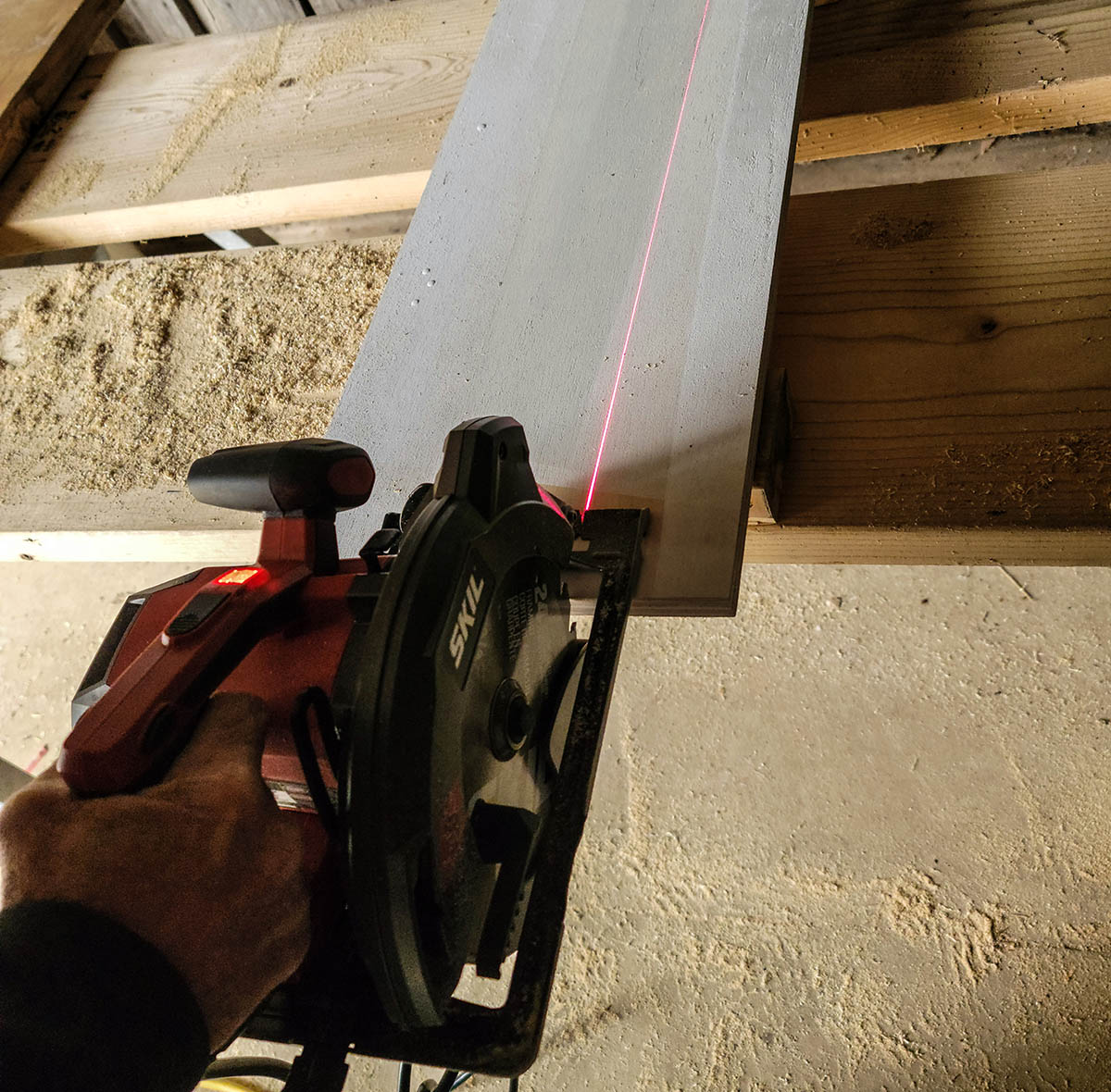
Our Top Picks
Choosing a circular saw doesn’t have to be confusing. Review the results of our hands-on tests as well as each tool’s pros and cons to help you select the model that’s right for your next project.
Best Overall
Makita XSH06PT 36V Brushless 7¼" Circular Saw Kit
What We Like
- Durable magnesium foot plate and blade guard
- Fast and simple blade depth and angle adjustments
- 2 bright guide lights for increased safety
What We Don’t Like
- Sawdust discharge port doesn’t work well with vacuum hose
Specs
- Power source: 36-volt (V) battery
- Speed: 6,000 RPM
- Size: 7¼ inch
The 36-volt cordless Makita circular saw takes top honors in our lineup of the best circular saws for several reasons. First, its base (or “shoe”) and its retractable blade guard are made from magnesium, which offers more durability than steel or aluminum at a lighter weight. It’s also powerful, has a long list of easy-to-use features, and offers an impressive cutting capacity.
We tested the Makita by making straight and bevel cuts of various depths on plywood and dimensional lumber. It powered through smoothly with no torque loss, even after the battery indicators showed less than half a charge. We made repeated cuts over an hour, and the Makita’s motor and housing never heated up.
We also liked that this battery-powered circular saw has a handy quick-change angle adjustment, allowing cuts up to 56 degrees with positive stops at standard angles of 22½, 45, and 56 degrees. Its depth is easy to adjust up to 2⅝ inches, making this tool great for quick-moving projects where you don’t want to stop and use a wrench to change settings. While this handheld circular saw also has a sawdust discharge nozzle for wet/dry vacuum hose connect, we noticed quite a bit of sawdust still escaped from around the blade guard, making this feature of the saw the only one we don’t totally endorse.
Read our full review: Makita XSH06PT 36V Brushless 7¼” Circular Saw Kit
What our tester says: “If I could only choose one circular saw for most nonshop situations—either a corded 7¼-inch model or the Makita XSH06PT—I’d choose the Makita. It offers as much cutting power as most corded saws, and purchasing a couple of extra lithium-ion batteries eliminates any downtime. Corded models are great when you’re in a shop with plenty of outlets, but this Makita is excellent when portability matters.”—Glenda Taylor, Product Reviews tester and writer
Get the Makita 36V circular saw at Amazon or The Home Depot.
Runner-up
DeWalt DCS573B 20V MAX 7¼" Cordless Circular Saw
What We Like
- Compact design is suitable for carrying
- Rafter hook enables secure hanging for safety
- Quick-adjust levers make changing blade depth and angle easy
What We Don’t Like
- Base shoe is aluminum not magnesium
Specs
- Power source: 20V battery
- Speed: 5,500 RPM
- Size: 7¼ inch
DeWalt is a leader in the power tool market, and this 20-volt cordless circular saw is a perfect example of why. It’s smartly designed and comfortable to use, and its powerful 20V motor with 5,500 RPM speed allowed us to make repeated straight and angled test cuts of various depths over an hour without it losing power or heating up. It has a bevel capacity of up to 57 degrees, with positive stops at 45 and 22½ degrees, making it handy to cut standard angles without needing to examine the angle measurements carefully before locking in. At 2 9/16 inches, it also offers a deeper cutting depth than most of its competitors.
While we would prefer a magnesium base instead of aluminum, we don’t consider this a deal breaker. The blade-angle-adjustment lever and the depth-adjustment lever save time when making adjustments, and the unit’s rafter hook adds to its versatility. For projects like framing a roof structure with dimensional lumber, it’s nice to be able to hang the saw on a rafter while performing another task and grab it when you’re ready to cut again.
What our tester says: “We like this DeWalt saw for pros, but we also think dedicated DIYers will use it a lot. It’s a great combination of well designed and ergonomic, and it had just as much power on the last cut of our tests as the first.”—Glenda Taylor, Product Reviews tester and writer
Get the DeWalt 20V circular saw at Amazon, The Home Depot, or Northern Tool + Equipment.
Best Bang for the Buck
Greenworks 24V 7¼" Cordless Battery Circular Saw
What We Like
- Budget circular saw suitable for most DIY-project cuts
- Comptabile with Greenworks’ 1.5, 2, 4, and 5Ah (amp hours) batteries
- Ergonomics are comfortable during use
What We Don’t Like
- Offers slightly less speed than some other models
- Blade guard is plastic instead of metal
Specs
- Power source: 24V battery
- Speed: 4,500 RPM
- Size: 7¼ inch
Not everyone needs all of the features of a top-of-the-line cordless saw or the heavy-duty capability of a timber-framing model. For DIY projects that include an occasional small framing job or breaking down plywood sheets—especially when saving money is a priority—the affordable Greenworks 7¼-Inch circular saw might be the right choice.
We’ve tested plenty of tools from many manufacturers, but this is the first Greenworks power tool we tried, and we were pleasantly surprised. Despite its affordable price, this circular saw made repeated straight and bevel cuts in plywood and dimensional lumber over an hour of solid testing without heating up on us or losing power. It tops out at 4,500 RPM, which is slightly less speed than some of the other saws we tested, but it will be sufficient for cutting the types of wood most DIYers will need to cut.
The CR24L00K features quick adjustments for both angle cutting (up to 45 degrees) and cutting depth (up to 2½ inches), and we found it simple to adjust both. The base shoe is made from stamped metal, which is to be expected at this price point, but we were disappointed that the blade guard is plastic—it really should be metal. The blade guard didn’t break during our tests, but it’s a weak point in the tool’s design.
Get the Greenworks circular saw (tool only) at Amazon, Lowe’s, or Greenworks.
Best Small
Makita XSS03Z 18V LXT Cordless 5⅜" Circular Trim Saw
What We Like
- Lightweight and small circular saw suitable for overhead cutting
- Compact yet offers a versatile 2-inch depth of cut
- Size plus cordless functionality make it incredibly portable
What We Don’t Like
- Dual-hand support too small for large hands
- Battery and charger sold separately
Specs
- Power source: 18V battery
- Speed: 3,600 RPM
- Size: 5⅜ inch
For part-time DIYers or smaller-framed users, Makita’s 18V LXT cordless 5⅜-inch circular saw’s small size and minimal weight make it an attractive, portable option. This lightweight circular saw weighs just 6 pounds, allowing DIYers of any size and skill level to wield it. It’s well suited to overhead cutting where it isn’t easy to wield a heavier circular saw.
Despite its minimal size and small blade, this Makita cordless circular saw has a depth of cut of up to 2 inches, offering more than enough capacity for cutting dimensional lumber. Its 3,600-RPM top speed should be capable of handling most projects, though the speed is less than some competitive models. The base bevels up to 50 degrees to allow users to make angled cuts.
Although small, we found that this portable circular saw packs quite a punch. It easily powered through straight and angled cuts in plywood and dimensional lumber. While the dual support knob is a little on the small side, we were able to use it to keep the saw stable while cutting. Most pros will probably forgo the dual support and use this model as a one-handed saw.
Get the Makita 18V circular saw at Amazon.
Best for Framing
Skil CR5429B-20 PWR CORE 20 Brushless 7¼" Circular Saw
What We Like
- Elongated design adds control and stability
- Two 20-volt batteries provide ample power
- Adjustable to a depth of 2 9/16 inches-—more than most 7¼-inch saws
What We Don’t Like
- Have to push a second button to adjust past 45 degrees
Specs
- Power source: Two 20V batteries
- Speed: 5,300 RPM
- Size: 7¼ inch
Those seeking a pro-level circular saw for DIY jobs should consider this Skil PWR CORE model. While it looks like a worm-drive saw because of its length and heft, it’s actually a sidewinder with its motor located next to the blade rather than behind it. Upon inspection, we realized the additional length comes from the positioning of the double-battery case, which sits to the rear of the motor.
In our tests, controlling the saw when cutting dense wood and larger pieces of dimensional lumber was made easy by grasping the rear handle and the dual stabilizer bar at the front. The saw’s two 20-volt, 5Ah batteries, provide more than enough power to make repetitive straight and angled cuts on plywood and dimensional lumber. Since it’s billed as a heavy-duty model, we also tested the saw on laminated veneer lumber (LVL), which is very dense and difficult to cut, and it cut through without bogging down.
We like this saw’s deeper-than-average cutting depth of 2 9/16 inches and its up to 53-degree-angle cutting capacity. What we don’t like is having to press a second lever to adjust the blade angle beyond 53 degrees, as it feels uncomfortable and seems unnecessary. We also would prefer a magnesium base shoe to the aluminum one, but we appreciate how the elongated shoe style helps stabilize the saw on deep cuts.
What our tester says: “This saw is well designed, ergonomic, and suitable for heavy-duty DIY use. It’s the Skil model we feel bridges the gap between a standard consumer and a pro tool.”—Glenda Taylor, Product Reviews tester and writer
Get the Skil PWR CORE circular saw at Ace Hardware, Lowe’s, or Target.
Best Laser Guide
Skil 5280-01 Corded 7¼" Circular Saw
What We Like
- Offers unlimited runtime as long as an outlet is nearby
- Laser guide bright enough for sunny days
- Impressive speed for its price point
What We Don’t Like
- Several components are plastic
- Cord restricts portability
Specs
- Power source: Corded 15-amp motor
- Speed: 5,300 RPM
- Size: 7¼ inch
Getting the hang of using a circular saw can be challenging, but operating a circular saw with laser guidance makes the process much easier. This Skil electric circular saw features a single-beam laser that allows users to maintain consistent passes on cutlines, taking some of the learning curve out of straight cuts. While we’ve found that some laser guides are dim or don’t extend more than a few inches, the laser on the Skil saw is a notable exception. Even outdoors on a mostly sunny day, it was visible on our cutting material for more than 2 feet.
In addition to its laser beam, this corded circular saw also boasts a 5,300-RPM top speed from its 15-amp motor, offering plenty of power and capability. It cuts angles up to 51 degrees and comes with a positive stop at 45 degrees—the angle used most often when cutting miters. Adjusting both angle and depth is simple via levers, and the tool comes with a maximum cutting depth of 2.4357 inches.
While we deem this saw a good choice for making straight and angled cuts on plywood and dimensional lumber, it’s not for heavy-duty sawing. The motor got pretty warm to the touch after about 45 minutes of use, which told us that we were pushing it further than it was designed to go. The saw also has several plastic components, which help keep the price down but make it better for novice DIYers needing a saw for small projects.
Get the Skil corded circular saw at Amazon, Ace Hardware, Lowe’s, or Walmart.
Best for Timbers
Skil SPT70WM-01 10¼" Magnesium Worm Drive Skilsaw
What We Like
- Worm-driving gearing provides maximum torque
- Magnesium base shoe is durable and stable
- Accommodates cuts up to 4 inches deep
What We Don’t Like
- 16.45-pound weight can result in user fatigue
- Cord restricts portability
Specs
- Power source: Corded 15-amp motor
- Speed: 4,700 RPM
- Size: 10¼ inch
Though this large circular saw from Skil weighs a hefty 16.45 pounds, has a substantial 10¼-inch blade, and operates at a respectable 4,700 RPM—it’s neither the biggest nor the fastest model on our list. Still, it produces enough torque to keep spinning through thick and dense timbers associated with post-and-beam and timber framing. During testing, we used it to make a variety of straight and angled cuts on dimensional lumber and an LVL, and it didn’t heat up at all.
As with most of today’s worm-drive saws, this model is corded because its size and torque demand more power than most lithium-ion batteries can produce. It performed flawlessly when we used it to bevel the edge of a large 8-foot-long 12-inch by 12-inch Hem-Fir beam, and it has an enviable cutting depth of 3 11/16 inches. It cuts angles up to 51 degrees, and both the blade angle and depth are easy to adjust via levers. Over our testing period, our arms and shoulders did get a bit tired from the weight of this saw, making this model a bit much for occasional-use DIYers. If you need to cut sizable dimensional lumber or timbers, however, this is the machine for you.
Get the Skil Worm Drive circular saw at Amazon or Lowe’s.
Best Kit
Bosch Profactor 18V 7¼" Circular Saw Kit
What We Like
- Good ergonomics and a nonslip grip
- Quick-change levers offer easy angle and depth adjustments
- Includes battery, charger, and bag
What We Don’t Like
- On the heavier side
- Cord restricts portability
Specs
- Power source: 18V batter
- Speed: 5,000 RPM
- Size: 7¼ inch
We’ve purchased “tool-only” power tools in the past, only to find we had to pay as much or more to then buy a compatible battery and charger. The Bosch Profactor circular saw gets around that issue by including the brushless circular saw, battery, charger, and a heavy-duty canvas bag as a complete kit.
But the Bosch isn’t just about a certain quantity of pieces, it’s also a quality tool that cuts up to 50-degree angles and 2½-inch depths. It features easy-to-change adjustments, and though its base shoe and blade guard are aluminum, it’s a well-built saw that, at 12 pounds, weighs slightly more than some of the similar 7¼-inch models we tested.
We made near-constant straight and angled cuts through dimensional lumber and plywood for over an hour, and this saw didn’t come close to overheating. An interesting aspect of this model is that its blade is on the left, whereas the blades on most 7¼-inch circular saws are on the right. While this took a little getting used to, we didn’t feel it was a downside—the saw can be used easily by a right-handed or left-handed user.
Get the Bosch circular saw at Amazon or Lowe’s.
Best for Pros
DeWalt DWS535B 7¼" Worm Drive Circular Saw
What We Like
- Pleasantly light at under 9 pounds
- Ergonomic design is easy to control
- High-quality magnesium base shoe and aluminum blade guard
What We Don’t Like
- Slightly shallower cutting depth than non-worm-drive competitors
Specs
- Power source: Corded 15-amp motor
- Speed: 4,800 RPM
- Size: 7¼ inch
DeWalt is well known for producing high-quality power tools, and the brand’s 7¼-inch worm-drive circular saw is no exception. It features a magnesium base shoe and lightweight aluminum blade guard, meaning it’s not as heavy as many worm drives. We also like its elongated base-shoe design, which creates a stabilizing effect when cutting denser materials. It has an easy-adjust blade angle that cuts bevels up to 53 degrees and offers positive stops at 22½ and 45 degrees, which are standard angles in the construction industry.
During our tests, we made both angled and straight cuts on plywood, dimensional lumber, and LVLs, and this DeWalt saw powered through all of them without heating up or bogging down. This corded circular saw features 4,800 RPM, which is less than some models, but it makes up for the slower speed with higher torque power. It features a 2.438-inch maximum cutting depth that’s also easy to adjust via a lever lock. We would have liked a deeper cut capacity, but this is still a top-performing 7¼-inch circular saw.
Get the DeWalt worm drive circular saw at Amazon, Ace Hardware, or Lowe’s.
ALSO TESTED
We had high hopes for the Black+Decker 20-Volt Compact Circular Saw, but it didn’t quite live up to our standards. Unfortunately, this little 5½-inch saw couldn’t muster enough power to make a ½-inch-deep cut in plywood, even though its 20-volt 1.5Ah lithium-ion battery should have been sufficient for such a shallow cut.
Jump to Our Top Picks
How We Tested the Best Circular Saws
Putting together a list of good circular saws was more fun than work—after all, we have years of experience with these tools. Drawing on our expertise, we whittled our testing list down from over 25 to just 10 carefully selected models. We then used our selected saws to make straight and angled cuts in a variety of materials for a solid hour.
When cutting, we only used manufacturer-suggested materials for each model, not attempting to cut LVLs, which are very dense and difficult to cut, with compact circular saws that are not made to withstand that type of cutting. Likewise, we didn’t bother cutting plywood with worm-drive saws, which are explicitly designed to cut denser, thicker materials like timbers.
We monitored each saw to see whether it got hot during use, how easy/challenging it was to adjust blade angle and cutting depth, and if it lived up to the manufacturer’s depth claims. We scored each machine based on a rubric and used our results to determine each tool’s best use.
What to Consider When Choosing a Circular Saw
Motor alignment, run speed, amperages, and blade types are all essential aspects of a circular saw, so here’s a quick primer on all the types of circular saws and necessary considerations to get your search started.
Corded vs. Battery-Powered
As with any type of saw, corded circular saws tie the user to the power source (i.e., an electric socket), whereas battery-operated models can be used anywhere. On professional job sites, cordless circular saws were once shunned in favor of corded models, but with the recent improvements in lithium-ion batteries, this is changing.
Today’s battery-operated cordless circular saws have much more power and far longer battery life than early models. Much of this improvement is due to the adoption of brushless motors (the latest, most efficient, maintenance-free technology) and higher-quality lithium-ion batteries, though the most powerful models are still corded.
According to Ron Shimek, President of Mr. Handyman, a Neighborly company, “A corded saw is the best option for consistent power and performance. Corded saws typically offer superior power and cutting capacity, especially for demanding tasks like ripping through thick lumber.” He points out, however, that cordless options are ideal for outdoor or remote jobs, so you may need different tools for different circumstances.
Sidewinder vs. Worm Drive
Sidewinder and worm drive refer to motor alignment and position on a circular saw. A sidewinder model’s motor is installed in line with the blade, enabling it to run at high speeds in a compact footprint.
A worm-drive circular saw has a motor in the rear of the saw and uses a set of worm gears (so-called because of their spiraling worm shape) by the blade. Worm-drive saws, which are usually longer, larger, and heavier than sidewinders, tend to reduce speed but increase torque (force). They also require oil to lubricate the gears, so users should check their oil level daily.
For speed, size, and ease of maintenance, a sidewinder model is the way to go. For power and torque, worm-drive saws reign supreme.
Amperage and Speed
Amperage is the amount of electrical power a motor can withstand without its inner components failing. In the past, electric motors were weaker and not as capable, so amperage (amp) was an important specification to tout. Nearly all modern corded circular saws feature 15-amp motors.
A saw’s speed, however, can be a consideration since the faster the blade spins, the quicker it can cut through a material. But speeds tend to be relative because a 15-amp motor can spin a 7¼-inch blade faster than a 10¼-inch blade. Generally speaking, when it comes to 7¼-inch saws, speeds between 4,000 and 5,500 revolutions per minute (RPM) are common and should be adequate for fast, accurate results. Worm drives may offer slightly lower speeds but come with more torque (spinning force), so while they may cut more slowly, they won’t overheat or bog down during big cutting jobs.
Keep in mind that blade speed has very little to do with the density of material a saw can cut. This is largely dependent on the blade type and quality, and you may need to change a circular saw blade to a higher-quality version to cut denser substances.
Blade Size and Type
One noticeable difference among circular saw models is the size of their blades, as each uses a specific-size blade. The average pro or DIYer can get most framing and construction jobs done with a 7¼-inch model. Compact saws might feature blades in the 5⅜-inch range, while large saw blades can be 10¼ inches or more.
Popular types of circular saw blades include all-purpose, framing, finish, and plywood blades. The tooth count (the number of teeth around a blade) determines which projects a blade works best for. The lower the tooth count, the rougher the cut will be, making these blades suitable for framing or demolition. Higher-count blades should be used for cabinetmaking, plywood, and finish work.
Pro Tip: Circular saws cut on the “upswing,” meaning the cutting half of the blade (the part under the shoe) spins toward the front of the saw. This will inevitably cause tiny slivers of wood to “tear out” of the wood—particularly when cutting plywood—creating noticeably rough edges that detract from the quality of work. To minimize this, lay a piece of painter’s tape over the cutline to hold these fibers in place. It’s also possible to cut wood face down to eliminate tear-out concerns on the face of the wood. For more tips, see our guide on how to use a circular saw.
Shoe Material
The base plate that rides on the workpiece is known as a shoe, which will generally be made of one of three materials:
- Steel, though once popular, is less popular today because, despite being inexpensive and sturdy, it’s also very heavy.
- Aluminum is far lighter than steel but more expensive and not as tough.
- Magnesium, which is about 30 percent of the weight-per-volume of aluminum, is the high-tech metal of choice for circular saw shoes. Magnesium is stronger than aluminum (and even steel in some applications) and easier to manufacture but considerably more expensive.
Ease of Adjustment
Certain materials, such as plywood and other sheet goods, require a shallow blade depth, while others (framing applications, 4×4 posts, etc.) demand the full depth a saw can muster. For true versatility, a circular saw should allow the user to make quick and accurate depth adjustments.
Almost all models feature levers or knobs to adjust the blade angle, known as the “bevel.” Knobs tend to be more accurate at dialing in the perfect angle, although they’re a bit of a hassle to loosen and tighten when wearing work gloves.
The most important consideration when it comes to blade angle adjustment is an easily accessible level or knob. Some manufacturers put these knobs in an inconvenient place—for instance, the rear of the saw between the handle and blade guard—but an angle-adjustment knob in front of the motor where it’s easy to access is the most thoughtful design.
Safety
Manufacturers build safety features into their machines to combat the dangers inherent to circular saws. One helpful safety feature is an electric brake, which stops circular saw blades almost immediately after the user releases the trigger. Older models would allow the blade to come to a stop on its own, which could result in a spinning blade coming into contact with something unintended.
Built-in LED lights and spring-loaded blade guards also offer significant safety measures. Work lights illuminate the workpiece, allowing the user to see the cutline and any debris or impending mistakes they should avoid. Retractable guards cover the blade as soon as the blade is removed from the workpiece, helping to minimize dangers.
Safety is also the responsibility of the user, so be sure to wear eye and ear protection when using a circular saw, miter saw, track saw, or table saw.
Additional Features
Some of the best circular saws offer additional features that make the job easier and faster. For instance, some models have dust-collection ports and detachable collection bags to help minimize the amount of sawdust on the cutline. Depending on the kit, cordless saws might come with extra batteries.
Another helpful feature that manufacturers offer with their saws is a built-in rafter hook. These hooks swivel out of the saw, allowing the user to hang them from a rafter, ladder, sawhorse, or another sturdy ledge. Builders have been attaching hooks to their saws for years, and manufacturers are now catching on.
FAQs
The most common use for a circular saw is cutting framing lumber to length. However, it can also trim deck boards, cut plywood sheets into cabinet panels, cut metal, and even trim plastic.
Circular saws can cut straight lines, make cuts with beveled angles, and even create a series of thin, shallow cuts known as dadoes or rabbets. These kinds of cuts are achievable on both hard and soft materials including pressure-treated or hard wood.
Both the Makita 36V circular saw and the DeWalt 20V circular saw are among the best circular saws for a variety of home projects, including those DIYers are most likely to tackle.
The best way to keep a circular saw straight is to clamp a straight edge to the workpiece and run the base against it. Another method is to place a small clamp on the front of the base to act as a guide. Ron Shimek, President of Mr. Handyman, a Neighborly company, also points out that “features like laser guides, beveling capabilities, and precise blade depth adjustment contribute to accurate cuts” and clean, straight lines.
Kickback can occur for a few reasons:
Don’t start the saw with the blade against the workpiece. Allow the blade to get up to speed before pushing it through the workpiece.
Semi-cut workpieces tend to droop, and this droop can cause sideways friction on the blade, pinching it in place. Support the workpiece until the cut is complete.
Hitting a knot in the wood can cause kickback because knots are harder than the rest of the wood. Look for knots when measuring the wood, and try to avoid cutting through them.
Meet the Tester
Glenda Taylor is a product tester and writer specializing in the construction, remodeling, and real estate industries. She and her husband own a general contracting company, and Taylor is experienced in both residential and commercial building applications. She tests a wide range of power tools as well as other home improvement, household, and lawn-and-garden products.
Additional research provided by Tom Scalisi.
